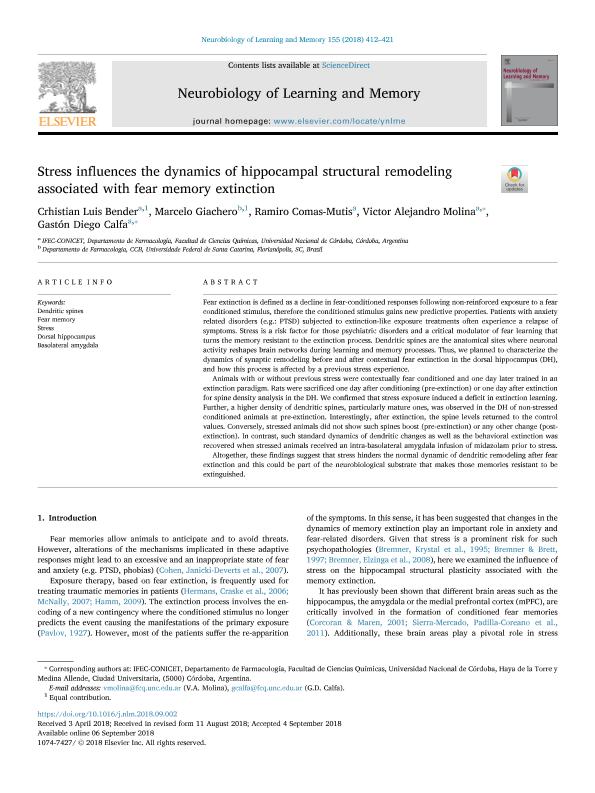Mostrar el registro sencillo del ítem
dc.contributor.author
Bender, Crhistian Luis

dc.contributor.author
Giachero, Marcelo

dc.contributor.author
Comas Mutis, Ramiro Gabriel

dc.contributor.author
Molina, Víctor Alejandro

dc.contributor.author
Calfa, Gaston Diego

dc.date.available
2019-11-25T13:15:36Z
dc.date.issued
2018-11
dc.identifier.citation
Bender, Crhistian Luis; Giachero, Marcelo; Comas Mutis, Ramiro Gabriel; Molina, Víctor Alejandro; Calfa, Gaston Diego; Stress influences the dynamics of hippocampal structural remodeling associated with fear memory extinction; Academic Press Inc Elsevier Science; Neurobiology of Learning and Memory; 155; 11-2018; 412-421
dc.identifier.issn
1074-7427
dc.identifier.uri
http://hdl.handle.net/11336/89640
dc.description.abstract
Fear extinction is defined as a decline in fear-conditioned responses following non-reinforced exposure to a fear conditioned stimulus, therefore the conditioned stimulus gains new predictive properties. Patients with anxiety related disorders (e.g.: PTSD) subjected to extinction-like exposure treatments often experience a relapse of symptoms. Stress is a risk factor for those psychiatric disorders and a critical modulator of fear learning that turns the memory resistant to the extinction process. Dendritic spines are the anatomical sites where neuronal activity reshapes brain networks during learning and memory processes. Thus, we planned to characterize the dynamics of synaptic remodeling before and after contextual fear extinction in the dorsal hippocampus (DH), and how this process is affected by a previous stress experience. Animals with or without previous stress were contextually fear conditioned and one day later trained in an extinction paradigm. Rats were sacrificed one day after conditioning (pre-extinction) or one day after extinction for spine density analysis in the DH. We confirmed that stress exposure induced a deficit in extinction learning. Further, a higher density of dendritic spines, particularly mature ones, was observed in the DH of non-stressed conditioned animals at pre-extinction. Interestingly, after extinction, the spine levels returned to the control values. Conversely, stressed animals did not show such spines boost (pre-extinction) or any other change (post-extinction). In contrast, such standard dynamics of dendritic changes as well as the behavioral extinction was recovered when stressed animals received an intra-basolateral amygdala infusion of midazolam prior to stress. Altogether, these findings suggest that stress hinders the normal dynamic of dendritic remodeling after fear extinction and this could be part of the neurobiological substrate that makes those memories resistant to be extinguished.
dc.format
application/pdf
dc.language.iso
eng
dc.publisher
Academic Press Inc Elsevier Science

dc.rights
info:eu-repo/semantics/openAccess
dc.rights.uri
https://creativecommons.org/licenses/by-nc-sa/2.5/ar/
dc.subject
BASOLATERAL AMYGDALA
dc.subject
DENDRITIC SPINES
dc.subject
DORSAL HIPPOCAMPUS
dc.subject
FEAR MEMORY
dc.subject
STRESS
dc.subject.classification
Neurociencias

dc.subject.classification
Medicina Básica

dc.subject.classification
CIENCIAS MÉDICAS Y DE LA SALUD

dc.title
Stress influences the dynamics of hippocampal structural remodeling associated with fear memory extinction
dc.type
info:eu-repo/semantics/article
dc.type
info:ar-repo/semantics/artículo
dc.type
info:eu-repo/semantics/publishedVersion
dc.date.updated
2019-10-16T15:07:08Z
dc.journal.volume
155
dc.journal.pagination
412-421
dc.journal.pais
Estados Unidos

dc.description.fil
Fil: Bender, Crhistian Luis. Consejo Nacional de Investigaciones Científicas y Técnicas. Centro Científico Tecnológico Conicet - Córdoba. Instituto de Farmacología Experimental de Córdoba. Universidad Nacional de Córdoba. Facultad de Ciencias Químicas. Instituto de Farmacología Experimental de Córdoba; Argentina
dc.description.fil
Fil: Giachero, Marcelo. Consejo Nacional de Investigaciones Científicas y Técnicas. Centro Científico Tecnológico Conicet - Córdoba. Instituto de Farmacología Experimental de Córdoba. Universidad Nacional de Córdoba. Facultad de Ciencias Químicas. Instituto de Farmacología Experimental de Córdoba; Argentina
dc.description.fil
Fil: Comas Mutis, Ramiro Gabriel. Consejo Nacional de Investigaciones Científicas y Técnicas. Centro Científico Tecnológico Conicet - Córdoba. Instituto de Farmacología Experimental de Córdoba. Universidad Nacional de Córdoba. Facultad de Ciencias Químicas. Instituto de Farmacología Experimental de Córdoba; Argentina
dc.description.fil
Fil: Molina, Víctor Alejandro. Consejo Nacional de Investigaciones Científicas y Técnicas. Centro Científico Tecnológico Conicet - Córdoba. Instituto de Farmacología Experimental de Córdoba. Universidad Nacional de Córdoba. Facultad de Ciencias Químicas. Instituto de Farmacología Experimental de Córdoba; Argentina
dc.description.fil
Fil: Calfa, Gaston Diego. Consejo Nacional de Investigaciones Científicas y Técnicas. Centro Científico Tecnológico Conicet - Córdoba. Instituto de Farmacología Experimental de Córdoba. Universidad Nacional de Córdoba. Facultad de Ciencias Químicas. Instituto de Farmacología Experimental de Córdoba; Argentina
dc.journal.title
Neurobiology of Learning and Memory

dc.relation.alternativeid
info:eu-repo/semantics/altIdentifier/doi/https://doi.org/10.1016/j.nlm.2018.09.002
dc.relation.alternativeid
info:eu-repo/semantics/altIdentifier/url/https://www.sciencedirect.com/science/article/pii/S1074742718302235
Archivos asociados
